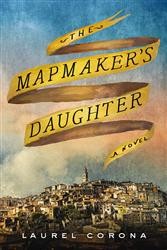Earlier this week, Laurel Corona wrote about emotion and developing the plot of her novel and her depiction of the mikveh in her recently published novel The Mapmaker’s Daughter (Sourcebooks). She has been blogging here all week for Jewish Book Council andMyJewishLearning.
 The father of philosopher Isaac Abravanel and grandfather of Judah the Lion (arguably the most famous member of this illustrious family) was in his own time one of the great leaders of Jewish Iberia. A courtier to the Portuguese king, Judah Abravanel financed many of the early explorations of Prince Henry the Navigator and served as an advisor on diplomatic and other matters. Judah Abravanel is also an important character in my novel The Mapmaker’s Daughter (Sourcebooks, 2014).
The father of philosopher Isaac Abravanel and grandfather of Judah the Lion (arguably the most famous member of this illustrious family) was in his own time one of the great leaders of Jewish Iberia. A courtier to the Portuguese king, Judah Abravanel financed many of the early explorations of Prince Henry the Navigator and served as an advisor on diplomatic and other matters. Judah Abravanel is also an important character in my novel The Mapmaker’s Daughter (Sourcebooks, 2014).
The difficulty I had fleshing out the character of Judah is the same as with all real-life individuals in my historical fiction. With invented characters, if I want to have them travel somewhere, I research how long it would take, what route was most likely, what conveyance they would use, and what might happen along the way. This research takes a great deal of time and effort, but once it is done, I can proceed with confidence to invent a story consistent with known facts.
With real life people, though, the challenge is different. There is a truth to their lives that can never be known. When Judah traveled, he took a specific route, had a specific means of transportation, and had specific experiences along the way. I cannot hope to guess right about all that. The standard to which serious and reputable historical novelists hold themselves may vary in some particulars, but the bottom line is that as long as we don’t do anything to misrepresent the person or the story, a novelist is free to fill in the details.
What has to be filled in, however, is almost everything that makes a novel — dialogue, everyday details, emotional life. I may not know specifically what Judah Abravanel had for breakfast, but if I know what was typical for Jews of the time, it is reasonable to put a plate of that in front of him. Assuming some reactions and emotions are universal seems fair as well. It’s either that or not write at all, so I make my peace with the idea that I can get many particulars wrong without telling untruths in a larger, more important sense.
With Judah I faced another dilemma, one which I think may give some readers pause. I want to avoid spoilers, so I must keep this general, and you can read the book if your curiosity is aroused. At one point he advises a young, intelligent, and spirited Jewish widow that she might want to consider nurturing a relationship with an attractive, unmarried Muslim man visiting Lisbon. “Wait a minute,” I hear you saying. “Could that happen?”
The answer, I believe, is yes it could. Would it? I don’t know. Do you? Since she was a widow, there was no chastity to protect and little chance any Jewish man would propose marriage. In fact, the Talmud strongly warns against marrying a widow for fear her late husband’s spirit would cause trouble. Still, it would take a very special man to care about this woman’s happiness, and to venture into the territory of her personal relationships.
Was Judah this kind of man? Possibly not. Perhaps he would have sternly admonished her to keep to her widow’s weeds and not question God’s will. That fits the stereotype, but how accurate are those? Perhaps we don’t give people of that time enough credit for having their own minds.
At any rate, I chose to think of Judah as recognizing that what falls outside of observance of Jewish law is a matter of choice, someone able to recognize what is no one else’s business. Maybe I’m wrong, but I like this version of him. Besides, as a novelist, an opening for a very romantic and passionate relationship is an opportunity not to be missed. It is fiction, after all, and historical novelists count on readers to remember that.
Laurel Corona is a professor of Humanities and World Religions at San Diego City College. She received a Christopher Medal for her non-fiction book Until Our Last Breath: A Holocaust Story of Love and Partisan Resistance (St. Martin’s Press, 2008), and in addition to The Mapmaker’s Daughter (Sourcebooks, 2014) has written thee other novels focusing on real women overlooked or misrepresented in history. Visit her website here.
Related Content:
- Historical Fiction Reading List
- Essays: Writers On Their Research
- The Elixir of Immortality (Gabi Gleichmann)
- By Fire Possessed: Dona Gracia Nasi (Sandra K. Toro)



